The human attention span is now less than that of a goldfish – 8 seconds.
Experienced writers know this calls for creating engaging content that provides answers to their audience’s most pertinent questions.
That alone isn’t sufficient, though. You can’t afford to have a single loose sentence in your writing, whether that’s a blog post, a product description or an evergreen article.
Heck, just one wobbly word that deviates from your central idea will diminish your reader’s interest and your credibility.
In other words, your blog posts need to be succinct, useful and relevant. You (or your blog editor) need to be ruthless in the editing process, which goes way beyond a spell check.
The first draft of your blog post may not be your best.
It will likely have weak and redundant words. Your arguments might tend to slack off or be devoid of substance. Even your post title might be lacking.
You’re not alone. 26% of college graduates have deficient writing skills. Being the internet generation, our words and grammar have taken a hit, as we consistently rely on texts and tweets to convey our thoughts.
But if you observe your prose intently–either while writing or when doing a post edit–you’ll find patterns.
There will probably be common weasel words, which decreases your authority and makes your writing sound lethargic.
Editing blog posts should entail a thorough read from several different angles.
True, that spell check is essential, but the editing process should also take into account the persuasiveness of your language too.
In this article, I’ve pointed out 8 common words that appear in blog posts and ultimately weaken your writing (and make a post editor cringe).
Wherever possible, I’ve suggested replacements and included examples. Eliminating these words will tighten your prose and lead to more compelling content.
Let’s make your blog posts sing.
1. Stuff/Things
Keep an eye out for ‘stuff’ and ‘things.’
You probably depend on these words when you’re unclear of the specific descriptive noun for the situation–a post title such as 4 things successful entrepreneurs do every morning, for example.
Or, maybe you use ‘stuff’ or ‘things’ when you want to keep your tone informal and conversational. For example – Can you please do this post editing stuff for me?
But, if you’re in a business environment, the informality of these words will make you sound unprofessional.
If you use these words excessively in your blog posts, then it’s time to replace them with more accurate and expressive diction.
Don’t expect the reader to spend extra energy to extract the exact meaning behind your writing. Content abound on the web and it’s easier for them to just close tabs and find another blog post that holds answers their questions faster and more efficiently.
If ‘stuff’ or ‘things’ run rampant in your blog posts, consider using one of these replacements, based on the context. Strategies, reasons, points, concepts, aspects, elements and principles are all solid, more precise words. Here are 10 more alternatives, by Speakspeak.com.
Example- 4 morning rituals of successful entrepreneurs. Now that’s an eye-catching post title, isn’t it?
2. Really/Very
Your job as a writer and/or post editor is to cut the fat when you can.
In other words, be vigilant in your editing process. Adverbs and modifiers that don’t add value to your work–or change your core meaning–should be omitted.
Post editing should always involve a search for ‘really’ and ‘very.’ Both of these words work like crutches, and, when used excessively, they make your writing vague.
Even Mark Twain didn’t like the word ‘very’ –
“Substitute ‘damn’ every time you’re inclined to write ‘very’; your editor will delete it and the writing will be just as it should be.”
Example – Blogging is really powerful for driving inbound leads. Or – SEO is very important for every online business.
The alternative to these words is using more potent versions of the words you’re modifying.
Example – Starving instead of really hungry. Or, exhausted instead of very tired.
Writerswrite has done a great job of making a blog and post editor’s job easier by compiling 45 word replacements for the word ‘very’. Have fun with them. The replacements will work in most cases, even for the word ‘really.’
Small tweaks like these will have an enormous impact on the quality of the persuasiveness of your argument.
Note: You can occasionally use these modifiers to convey emphasis, but extreme usage will lessen their impact. Overall, they’re noticeable and distracting.
Keep in mind that the same rule of thumb should be extended to your post title. 7 Really Good Things to Do for Your Business has much less conviction than 7 Excellent Ways to Achieve Success.
3. Think/believe/feel
If you’re writing an article, it’s understood that you feel or think or believe in the ideas that you’re sharing.
Using these words will only portray you as unassured and insincere.
Don’t announce new arguments by beginning your sentences with these words. And if you have? Cut them during the editing process and, instead, provide data, science, research and stats to support your ideas.
It’ll build credibility. Otherwise, get to the point directly and save your reader’s time.
I regularly share my opinions or predictions on my blog and they are fairly popular, because I ensure that every argument is backed by stats and research.
Here are 3 such recent articles that I shared:
- 6 Social Media Trends That’ll Help You Shape Your Marketing Strategy in 2016
- The Future of SEO: 5 Stats That Show Where Google is Heading
- 11 Alarming Online Marketing Stats That Should Influence Your Strategy in 2016
If you don’t have any substantial data support, eliminating these timid words from your writing will make it more convincing and impactful.
Let me demonstrate with an example.
Original: I think that college education isn’t necessary to venture into internet marketing.
Alternative: You don’t need college education to venture into internet marketing.
If you came upon these sentences in two different blog posts, which writer would you trust more?
4. Is/Am/Are/Was
A seasoned writer understands the difference between an active and passive voice.
The first commands attention. The second makes your writing sound vague and unpersuasive.
When you aren’t aware of the subject that performed the action, then you might be tempted to turn to a passive voice.
Using different versions of the verb, “to be,” is an indication of the passive voice. And, it might mean leaving out essential information.
Moreover, when your subject receives the action, it can confuse the reader and give your blog post unnecessary bulk.
Unless it’s academic writing, it’s typically better to use an active voice. This might involve extra research and conscious effort, but it’s worth it.
Original: Email subscribers were lost and traffic dropped.
Alternative: A couple of spam emails triggered email subscribers to opt out, thereby decreasing traffic to the website.
Note: It’s okay to use passive voice when you actually want readers to pay attention to the object of your sentence, rather than the subject. Or, use it when you’re unaware of the subject, but want to convey information to your readers.
5. Better/Almost
These words are ubiquitous in blog posts. Sadly so, as they symbolize vagueness.
If you work with a post editor who’s excellent at cutting these words, great. If not, ‘better’ and ‘almost’ should be paid attention to in your editing process.
Why?
Here’s an example: you can’t conclude why a subject is ‘better’ and the yardstick against which it’s ‘better.’
Similarly, ‘almost’ is an approximation that leaves an element of doubt for readers. Using either of these excessively will diminish your writing’s effectiveness.
A great alternative is providing your readers with specific information and data.
Let me give an example for both words.
Original – Now, your traffic is better.
Alternative – Your traffic is much better, after incorporating social media marketing last month.
Original – You’ve almost completed the writing course.
Alternative – You’re only two 10-minute lectures away from completing the writing course.
6. Amazing
Movie titles. Advertising Slogans. Professional email exchanges. Social media news feeds. Buzzfeed headlines.
Look around and you’ll find that ‘amazing’ is used, misused and overused every single day. Plus, there’s no need to describe a subject as surprising, remarkable, mind blowing or wonderful.
And yet, ‘amazing’ often creeps into daily language as a synonym for any positive event, object, product–you name it.
Rarely, however, do you need to promise that an experience or product will make someone’s heart melt.
Nor do you need to describe an event as astounding. For example – Watering my plants was amazing. (Maybe you meant ‘satisfying’?)
In short, the word has become overused to the point of obscurity. It’s lost its impact. Think of ‘awesome,’ which became so overused awhile back that its original meaning got muddled. Come across ‘awesome’ in a blog post now and you’ll probably be a bit dubious.
Google books found the following surge in the word’s usage. And, mind you, this is how the word’s use has shot up in printed books and less so in social media conversations.
Since ‘amazing’ has lost its sheen and original meaning, I recommend that you (or your post editor) use the word only as it’s defined: when you’re truly stunned or astonished. I suspect that isn’t going to happen often.
Rachel Parker has compiled 101 alternative words, so that you can retire the word ‘amazing’ (and ‘awesome’ while you’re at it). .
7. Maybe/Perhaps/Always
People read your blog to learn from you.
If you want to be perceived as an authority in your niche, do the research and present a firm opinion in your blog posts. Readers can spot uncertainty from a mile away.
‘Perhaps’ and ‘maybe’ contribute to that. Neither make the cut in concise and authoritative writing and should be taken out during the editing process. Your audience does not want to read long and random ramblings filled with indecisiveness and watery prose.
Let me demonstrate, with an example, how you can omit timidity from your writing:
Original – Maybe SEO will still matter for building website traffic in 5 years.
Alternative – SEO is not going to disappear in 5 years. Only the lines between social media and SEO will blur.
Most times you’ll find that deleting the word in a sentence will restore certainty and make you sound more confident.
Original – Perhaps blogging can help your business get more leads and subscribers.
Alternative – Blogging can help your business get more leads and subscribers.
‘Always’ is on the other end of spectrum.
In most cases, it’s a forceful and hyped way of presenting your argument.
Instead of finding out the specific instances when an event occurs, you took the lazy route and used ‘always’. Most often, you’ll find that there are exceptions to your ‘always’ absolute statement.
Similarly, the word ‘never’ is dangerous and may make you sound ignorant. Let me show you an example.
Original: Always wake up at 5 am and start writing.
Alternative: For many writers, early morning is the best time to get work done. It’s a great starting point to find the time when you’re most productive.
This suggestion extends to some of your post’s titles as well. ‘Always’ (and ‘never’) can sound gimmicky, suspicious, even uninformed. 7 Tips to Always Attract Your Audience is less powerful than 7 Surefire Ways to Write Captivating Copy.
8. Just/Literally
Neither of these filler words add value to your argument.
Deleting the word ‘just’ will, most times, tighten your prose without affecting the meaning of the sentence. Many times, this word is supposed to soften requests, but it ends up hurting your credibility and undermining your message. Here’s an example.
Original: Just publish high-quality content consistently every week for 6 months and you’ll start to see search engine traffic surge.
Alternative: Publish high-quality blog posts every week without fail – after 6 months, you’ll start to experience the fruits of your dedication and see a surge in search engine traffic.
Similarly, it’s obvious that you’re literally meaning the arguments you’re publishing in your blog posts. There’s no need to clarify it. The word is used (or often misused) in informal conversations, when you want to be taken seriously in the midst of a joke.
Its overuse triggered “Parks and Recreation’’ co-creator, Michael Schur, to craft Rob Lowe’s character for his NBC sitcom with a love for the word.
Most often, you’ll find that it is, in fact, misused as a synonym for ‘really’ or ‘actually.’
Original: You literally need to write every day to improve your creative abilities.
Alternative: Write every day to improve your creative abilities.
2 tools to help you cut slack from your writing
Whether you’re a post editor with years of experience or new to editing blogs posts, this list of commonly overused and weak words should help you spot–and avoid–them.
Other ineffective words exist too, of course. For a more complete list, see Jon Morrow’s list of 297 flabby words. It’s one of the best and most exhaustive compilations I’ve come across.
To help you write livelier and more persuasive content, here are a couple of tools that might be of interest to you.
More advanced than your device’s text editor, these tools both expedite the editing process and provide enlightenment. They’ll help you cut the slack, write more powerful blog posts (and other copy) and prevent you from sabotaging your brand.
1. Hemingway App – Ernest Hemingway was renowned for his brief sentences and simple language. This simple text editor app analyzes your writing and helps you tighten your prose.
Once you paste a paragraph into the tool, your text will be highlighted with –
- simpler alternatives to weak words,
- instances of passive voice,
- hard to read sentences,
- a grade score of the readability of the text
Here’s an analysis of a chunk of text from my beginner’s guide to online marketing.
You can see that there are 6 sentences that are hard to read and the overall readability is at grade 8. Once you fix the long sentences, your readability score will improve. It’s a great tool to find out your recurring writing mistakes.
2. Copyscape – Copied and republished content from your website can rank higher in search results. Journeys by Design was found to lose their rankings to duplicate content.
Meet Copyscape – it’s a great tool to find the genuineness of content and find any floating plagiarized pieces (stolen or duplicated) from around the web.
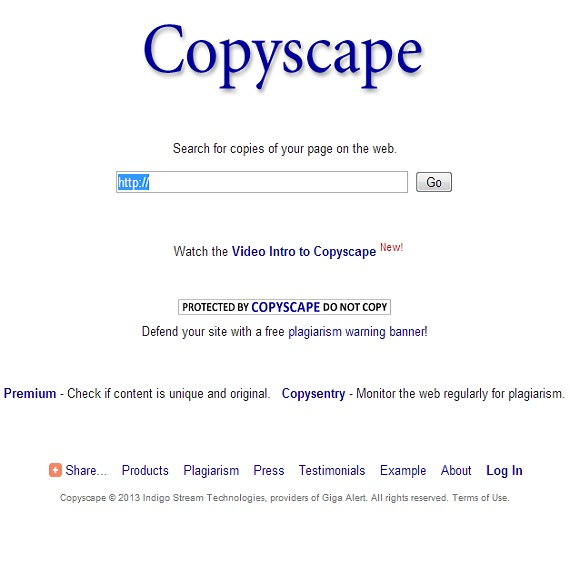
From blog posts to evergreen articles, you know that content is king.
It can also be a deciding factor for consumers.
Global Lingo found that 74% of consumers paid attention to the quality of grammar and spelling on a brand’s website. 59% of those said they wouldn’t deal with a company that had an obvious grammar or spelling mistake on their website.
To say that it’s important to pay attention to your presentation, then, is an enormous understatement.
The editing process involves much more than a spell check or quick post edit. Grammar, punctuation, language, authority–all are crucial to a business’s success.
Unpolished blog posts–or a post title that’s evasive and unconvincing–can dramatically weaken your content marketing efforts.
Pick a blog post you’ve written and search for occurrences of the words I’ve listed here. There’s a high possibility that you’ll find a couple instances of these words diluting your credibility and the quality of your writing.
Generally, I recommend removing these words from your content. However, understanding the context where I’ve mentioned these weak words is of utmost importance. You might find that using these words at times will not weaken the language or lower your credibility. Consider it, then, a situational demand–and here’s to writing the most engrossing content possible.
It’s your turn now. Which of the above words are you guilty of using excessively in your writing? Are there any other weasel words that you see tossed around in blog posts? Let me know in the comments below.

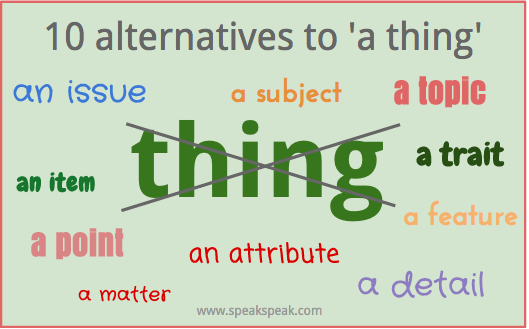
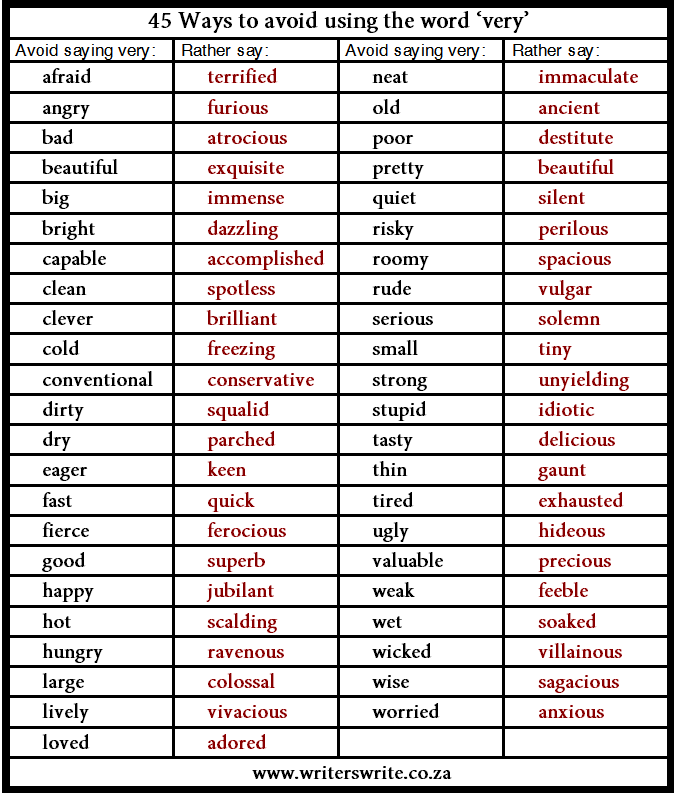
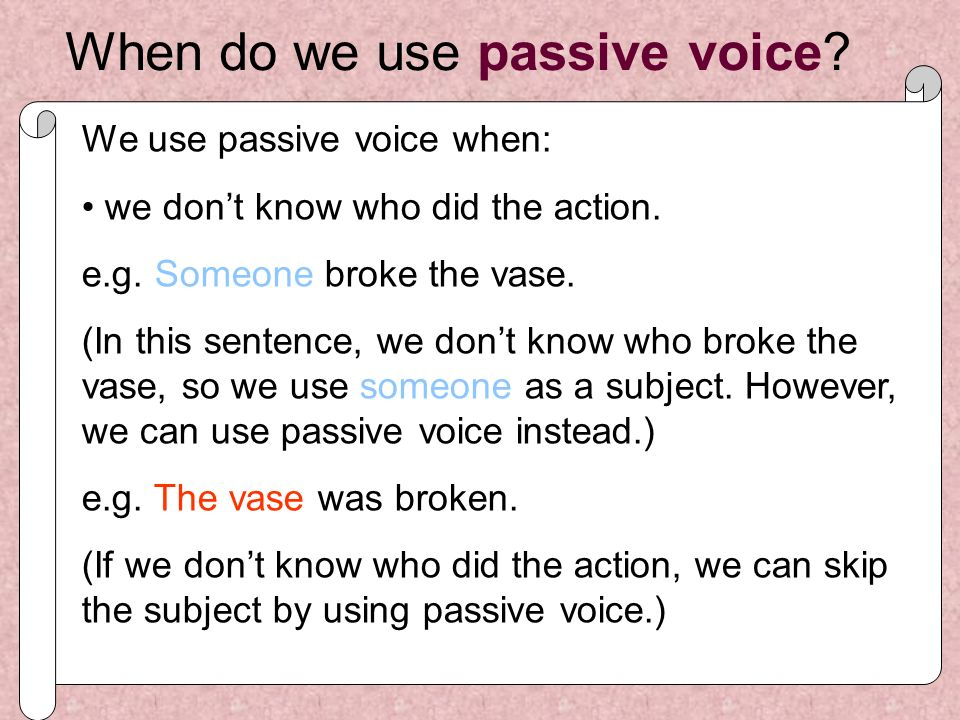
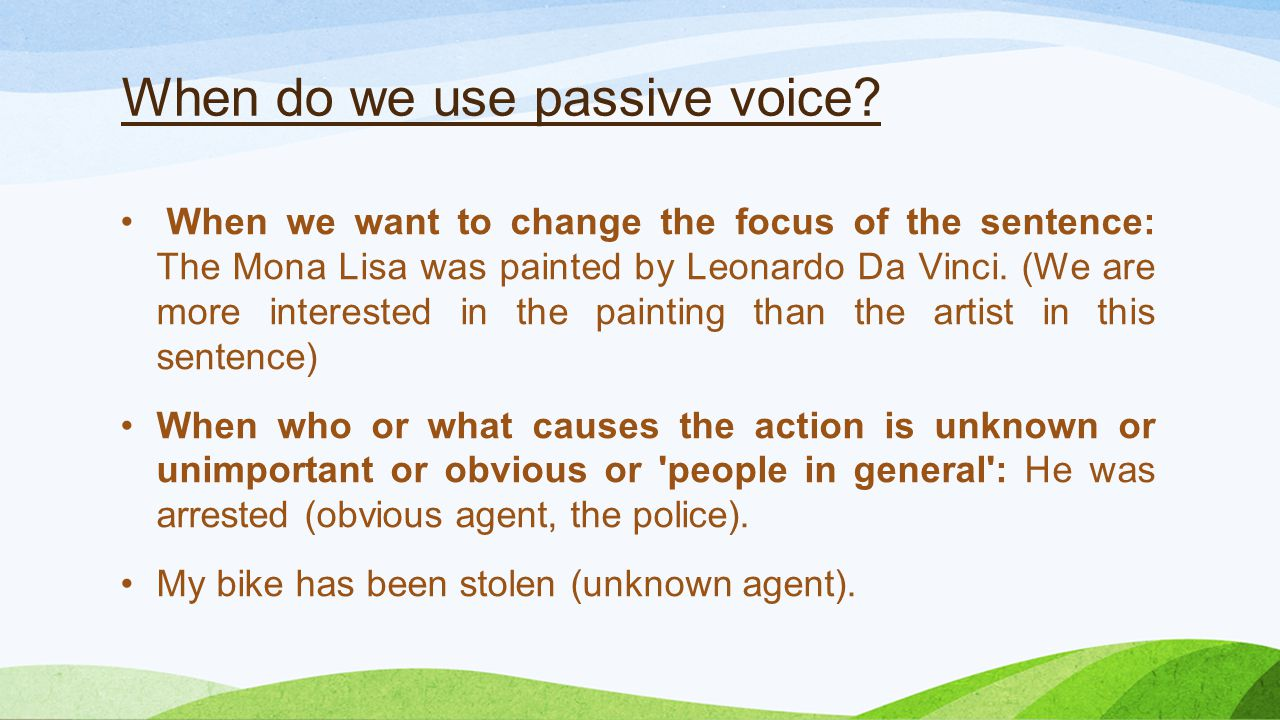

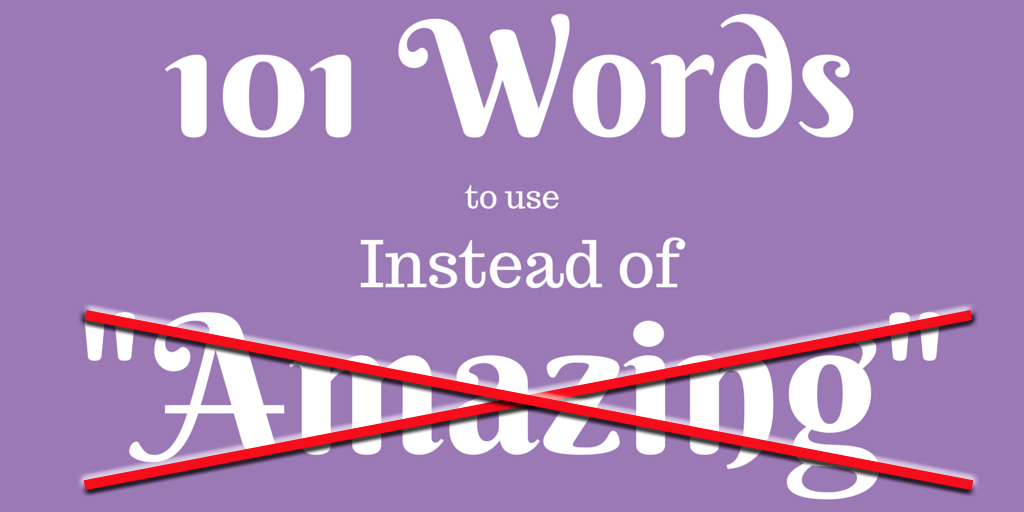

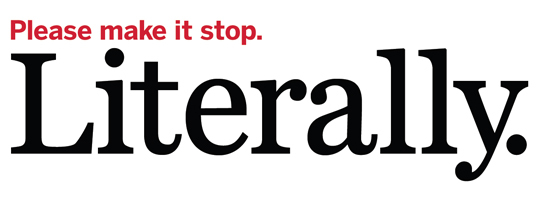
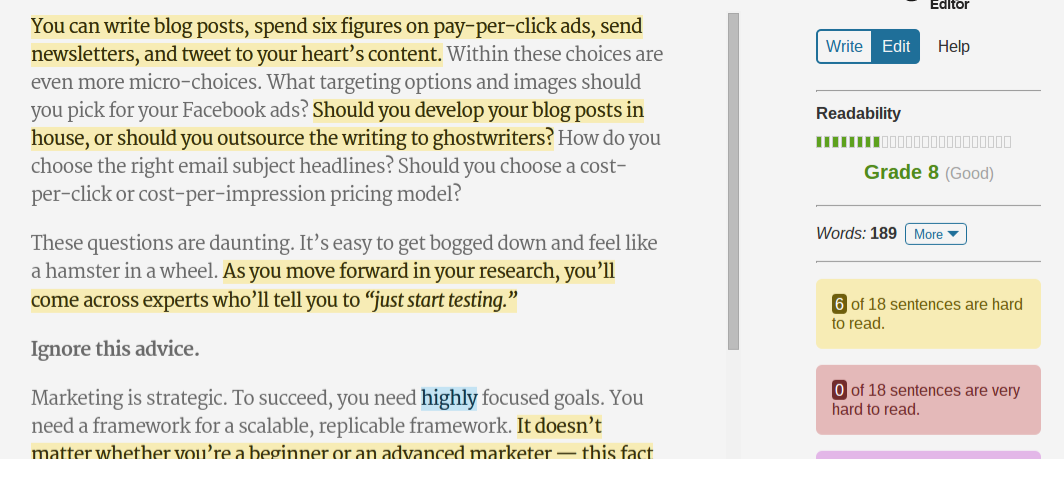
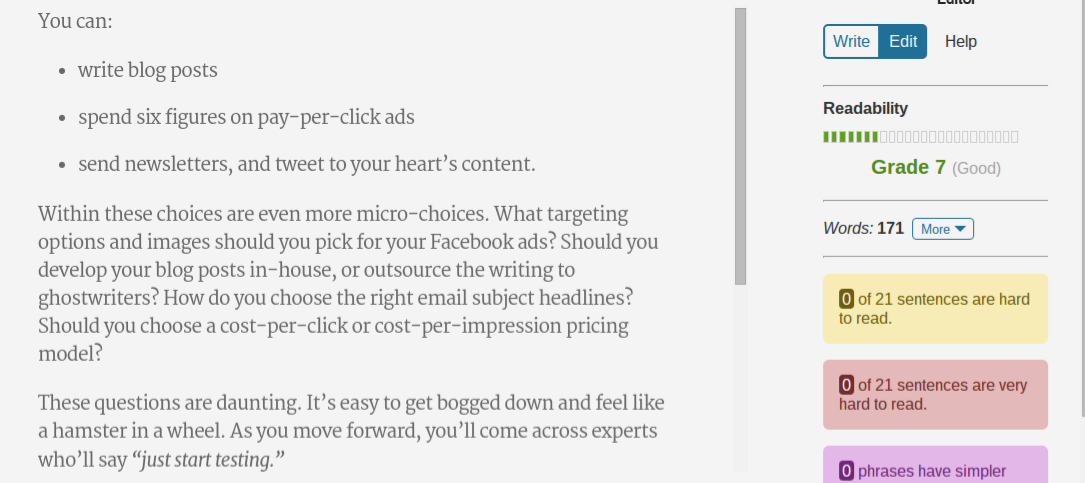

Comments (41)